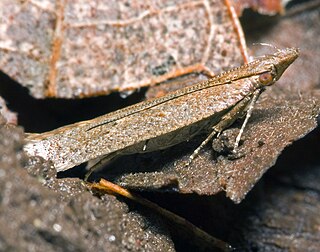
Laridae is a family of seabirds in the order Charadriiformes that includes the gulls, terns, noddies, skimmers, and kittiwakes. It includes around 100 species arranged into 22 genera. They are an adaptable group of mostly aerial birds found worldwide.

Podocarpaceae is a large family of mainly Southern Hemisphere conifers, known in English as podocarps, comprising about 156 species of evergreen trees and shrubs. It contains 19 genera if Phyllocladus is included and Manoao and Sundacarpus are recognized.

The Gelechiidae are a family of moths commonly referred to as twirler moths or gelechiid moths. They are the namesake family of the huge and little-studied superfamily Gelechioidea, and the family's taxonomy has been subject to considerable dispute. These are generally very small moths with narrow, fringed wings. The larvae of most species feed internally on various parts of their host plants, sometimes causing galls. Douglas-fir (Pseudotsuga) is a host plant common to many species of the family, particularly of the genus Chionodes, which as a result is more diverse in North America than usual for Gelechioidea.

Eucinetidae is a family of beetles, notable for their large coxal plates that cover much of the first ventrite of the abdomen, sometimes called plate-thigh beetles. The family is small for beetles, with about 50 species in 11 genera, but are found worldwide.

Psychodidae, also called drain flies, sink flies, filter flies, sewer flies, or sewer gnats, is a family of true flies. Some genera have short, hairy bodies and wings, giving them a "furry" moth-like appearance, hence one of their common names, moth flies. Members of the sub-family Phlebotominae, which are hematophagous, may be called sand flies in some countries, although this term is also used for other unrelated flies.

The Hygrophoraceae are a family of fungi in the order Agaricales. Originally conceived as containing white-spored, thick-gilled agarics, including Hygrophorus and Hygrocybe species, DNA evidence has extended the limits of the family, so it now contains not only agarics, but also basidiolichens and corticioid fungi. Species are thus diverse and are variously ectomycorrhizal, lichenized, associated with mosses, or saprotrophic. The family contains 34 genera and over 1000 species. None is of any great economic importance, though fruit bodies of some Hygrocybe and Hygrophorus species are considered edible and may be collected for sale in local markets.
Edward Duckhouse was an English professional footballer who played as a defender. He made over 100 appearances in the top two divisions of the Football League for Birmingham City, playing his part in the Second Division championship-winning side of 1948, and also played for Northampton Town.

The Lecanorales are an order of mostly lichen-forming fungi belonging to the class Lecanoromycetes in the division Ascomycota. The order contains 26 families, 269 genera, and 5695 species.

The frog family Dicroglossidae occurs in tropical and subtropical regions of Asia and Africa, with most genera and species being found in Asia. The common name of the family is fork-tongued frogs.

The Psychodinae are the nominate subfamily of moth flies (Psychodidae), also known as drain flies. Like most of their relatives, they are usually found in damp habitats; some occur in caves. The small larvae are aquatic or semi-terrestrial; the adults are winged and capable of flight. Psychodinae are found worldwide, including some subantarctic islands.

Adeleorina is a suborder of parasites in the phylum Apicomplexa.

Cerylonidae are small to tiny, smooth, shiny, hairless beetles, only lightly punctured. There are about 450 species worldwide in 50 or so genera, mostly tropical and subtropical. They are most common under the bark of dead trees, but can also occur in compost and other decaying plant material. Little is known specifically about their biology but they are thought to be either predators that feed on other small animals, or fungus-feeders.

Gracillariinae are a subfamily of moths which was described by Henry Tibbats Stainton in 1854.
Catalog of Fishes is a comprehensive on-line database and reference work on the scientific names of fish species and genera. It is global in its scope and is hosted by the California Academy of Sciences. It has been compiled and is continuously updated by the curator emeritus of the CAS fish collection, William N. Eschmeyer.

Clambidae is a family of beetles. They are known commonly as the minute beetles or the fringe-winged beetles. They are found worldwide on every continent except Antarctica.
Alloeodidicrum is a genus of drain flies in the subfamily Psychodinae. It consists of two species.
Sycorax is a genus of moth flies and sand flies in the family Psychodidae. There are at least 40 described species in Sycorax.
Trichomyia is a genus of flies belonging to the family Psychodidae.













